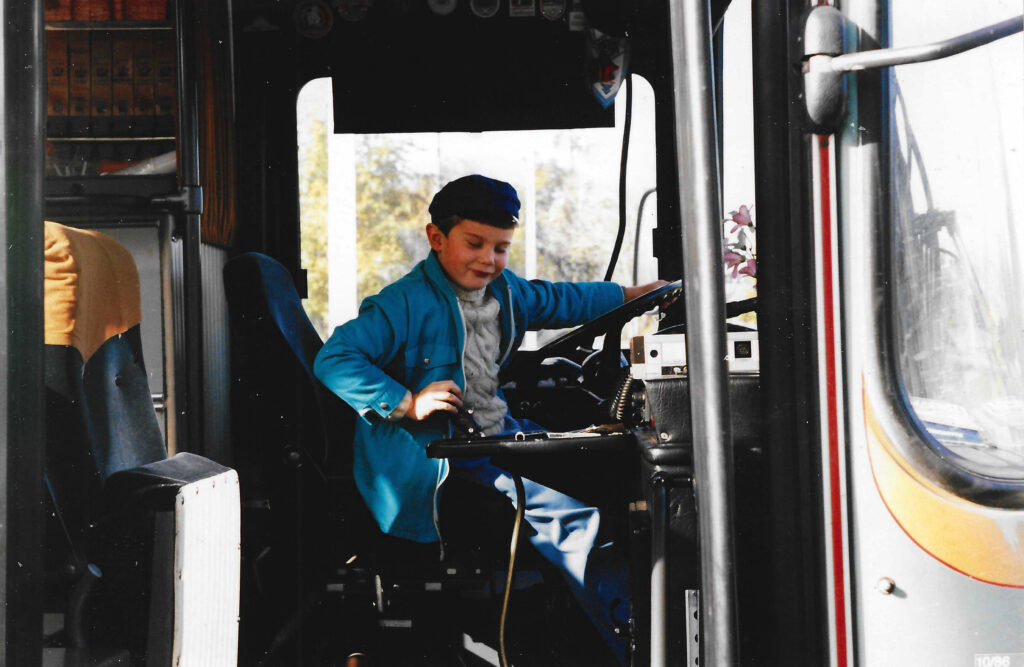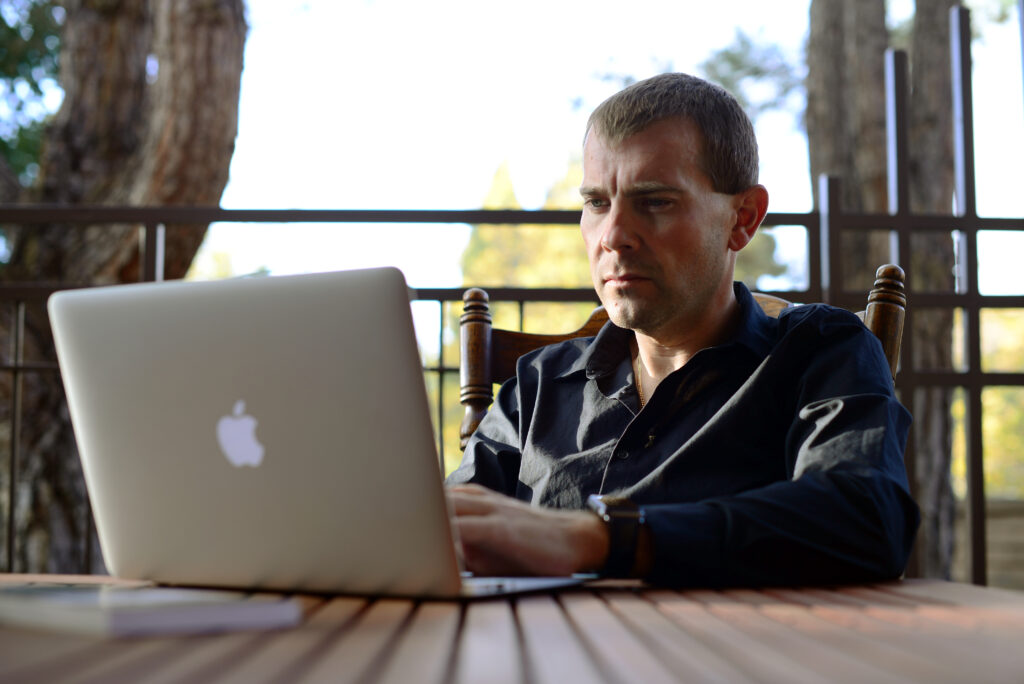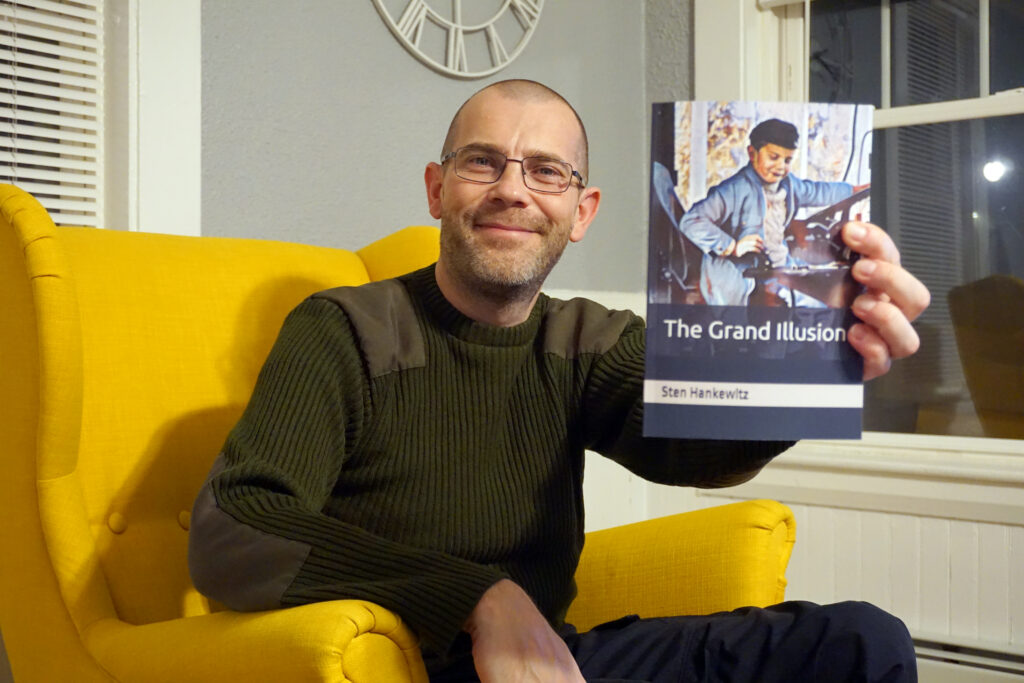Sten Hankewitz, a life-long journalist and Estonian World’s stalwart executive editor, has just published his second book in English – a semi-autobiographical coming-of-age novel about life in the Soviet-occupied Estonia and, shortly after the collapse of the Soviet Union, in free Estonia, a country reinventing itself, in the uncertainty and chaos that comes with it.
“The Grand Illusion” follows Hankewitz’s first novel, “Catch the Harpy” (2015) – while his first book was a pure fiction, with the story taking place in Berlin, his second is a semi-autobiographical work about growing up behind the Iron Curtain. I caught up with Sten to find out more.
What is “The Grand Illusion” about?
It’s about a boy who grows up in Estonia in the final years of the Soviet Union and the first post-occupation years of the Republic of Estonia – in the chaotic and sometimes lawless times where people could do pretty much whatever they wanted.
It’s about childhood, it’s about growing up and realising life can be complicated and challenging. It’s about bullying, childhood tragedies, but also about love, finding oneself, becoming somebody from being a nobody.
It’s about the joys and sorrows of being a kid – but not just any kid; a kid in a world that’s long forgotten, a place that hasn’t existed for decades. It’s a coming-of-age story from a forgotten time and place that many don’t even know existed and most can’t relate to.
“The Grand Illusion” can be grotesque at times, but it’s about how we lived back then, the things we did, the emotions we felt, the idiots we were and the idiots we encountered. The illusions we had about life, the reality we endured, the indifference of our fellow man, the cruelty of our peers.
It’s also about learning to come to terms with being powerless. It was what it was. Good, bad, interesting, tragic, devastating, ridiculous, whatnot. We just had to come to terms with it.
How much is it a fiction and how much an autobiographical novel?
It’s a semi-autobiographical novel. It’s a true story. While it isn’t. But it is. Maybe.
Was there any specific event or reason that inspired you to write this book? And how did you discipline yourself?
Well, I thought that I had a pretty interesting childhood and adolescence, and for years I contemplated writing this book. And the fact is, the English-language world doesn’t know much about the Soviet Union or the aftermath after its collapse in the countries it had occupied or ruled. So, why not write about it from my perspective?
Living in old democracies like the UK and the US also opened my eyes to the fact how interesting, how out of this world was the place where we grew up. I mean, the people here who have always enjoyed democracy and the rule of law can’t even imagine how we lived and what we did. Maybe it would be interesting for them to read about it?
And I figured it should be an easy subject to write about. The thing I know the best and love the most – me. I mean, if there’s anything in this world I know, it’s me, right?
How did I discipline myself? Funny you should ask. A friend of mine met Margaret Atwood recently and she told him that, as she gets older, writing becomes more challenging – one needs to be more disciplined and concentrate more. I’m by far not as experienced a writer as Margaret Atwood is, but I understand the sentiment. Finding discipline when writing can be the hardest of things. Discipline is what every writer needs, and most lack, I think – myself included.
That being said, writing about what you know the best and love the most, kinda helps. You can’t force yourself to write when you’re not feeling like it, but once you get going, it’s sometimes hard to stop. While writing “The Grand Illusion,” I sometimes wrote until the late hours because it just wanted to burst out. And then there were periods when I just sat behind the computer, staring at a blank sheet, and just nothing came out.
I guess you just wait for inspiration and when it comes along, nothing will stop you. That doesn’t only apply to writing, by the way.

You describe in detail some of the aspects of your life in the Soviet-occupied Estonia. Was it also somewhat difficult to take this trip down the memory line?
It was more on a personal level. I mean, I was just a kid back then, I didn’t know any better, I didn’t know that state of affairs shouldn’t have been, shouldn’t have existed. It was sad to think about the people I had loved and lost, but in terms of the life in the Soviet Union, for a child, what did we actually understand? Finding out what a banana is when you’re six years old? We had no expectations.
We all know now that the Soviet Union was an evil empire, that people were oppressed, lived in fear, there were no freedoms whatsoever. But back then, it was our reality. So, thinking about the past, while it was complicated, it wasn’t a difficult trip down the memory line in the sense that, what happened, happened. I’m fine with it.
How much is known about the life in the former Soviet Union in the US, your home for the last 10 years?
Absolutely fuck-all. I mean, people who immigrated to the US from the Soviet Union, they know. But your average Joe, he knows nothing. Go ask in Brighton Beach, New York, what they know, and they will have stories that will make your skin crawl. Go ask in Billings, Montana, and they will look at your sheepishly and go about their daily lives.
What would be the greatest lesson you took from that period in your life?
Well, it was a very long period, from my becoming aware to graduating high school, so some fourteen to fifteen years. Perhaps the fact that we wouldn’t be the person we are when we’re grown up if we hadn’t been the kid we were back then. Our childhood, no matter how hard, how easy, how fucked up or how rosy, it forms us, it sculpts us, it makes us what we are.
I dedicated the book to my parents. Maybe the lesson is, no matter how badly our parents mess us up (and all parents do that), for better or for worse, they make us what we are.
“The Grand Illusion” contains many personal stories and recollections, from positive to negative – what’s your own favourite story in the book?
Oh, fuck me. I’m thinking, the time I worked with the German film crew that was shooting in Estonia in the 1990s, and I had the honour of working with. I worked alongside Ulrich Mühe and Inka Friedrich (German actors – editor) while I was a little boy – and they were the absolute best people in the entire crew. They were both stars of the German cinema, and they treated me as equal, as an adult. And even though the Estonian film crew members didn’t always treat me well, the Germans did, and that lifted my spirits to the moon. I worked alongside Ulrich Fucking Mühe (God rest his soul); that made me feel like a rock star.
But in general, it’s a story of my life – as true or fake as it is. So the entire book is my favourite, because it’s about me, written by me. I have no regrets because regretting anything about your life is pointless, you can’t change anything.

It’s your second book – the first one, “Catch the Harpy”, was published in 2015. Do you think you have developed your “writer’s voice” now?
Well, as I said, I contemplated writing this book for a long time. But I didn’t know how to write it, so I took some time to figure it out. And figure it out I did. This book is very different from “Catch the Harpy”, so it needed a different style, a different voice.
The storyteller of the “The Grand Illusion” is a young alter ego of mine. Once I got going, this voice came very easy, very naturally to me. It’s just thoroughly me. So yeah, I think this book helped me develop my writer’s voice.
What do you read – who are your favourite writers and who inspires you?
My influencer for this book is definitely Charles Bukowski. But I also think Kurt Vonnegut inspired me on this book a little. My mom – who read it before it was published even though this is not a book the writer’s parents should read – said she also noticed Ernest Hemingway in it, but if that’s the case, it wasn’t intentional. I mean, I love Hemingway, but I didn’t think he was an influence here.
These days, I mostly read political biographies and memoirs. I’ve always loved politics, and 2016-2020 were a very fertile ground for writing them, at least here in the United States. But also before the Trump presidency, my book shelf had memoirs by Tony Blair, George W. Bush, Arnold Schwarzenegger. Actually, these books are still here on my bookshelf.
Of fiction writers, well, I’ve mentioned Bukowski, Vonnegut and Hemingway. Mario Puzo has always been one of my favourite authors. Douglas Adams has his moments. John Le Carré, Ian Fleming (I’m actually one of those rarities who loves both Le Carré and Fleming; they’re different, but equally engaging), Dan Brown (he’s my next-door neighbour, we hang out all the time. No, not really, he lives some 20 miles away.) I have yet to find a work by Stephen King I didn’t love. And I’ve tremendously enjoyed Tom Clancy, Anthony Burgess, Lee Child, Truman Capote. But there are, of course, tons of authors who are absolutely brilliant.

Who should definitely read this book?
Everyone. But especially everyone born after 1985 in the Soviet-occupied countries or the Soviet satellite states, I’m thinking. My brother was born in 1984 and I think he still remembers, but the kids born later than that, I think they don’t anymore.
And everyone elsewhere. As I said in the beginning, this is a book from a forgotten time and place that many don’t know ever existed and most can’t relate to. A friend in the US told me that no one in the US gives a flying fuck about the Soviet Union or Estonia. That may be so. But learning about what it was like back then, it’s like a history lesson. The only way we can prevent history from repeating itself is knowing what to expect and what to prevent.
So maybe when a kid reads it, anywhere in the world, be it North Korea, Cuba, China, Russia, or anywhere around the normal world like the US, the UK, anywhere in the democratic world where freedom is taken for granted, maybe they will relate to it in terms of that they never want this shit to be their reality. And maybe their parents will also think, they don’t want the reality where I grew up to be their or their kid’s reality.
And then again, the post-Soviet part of the book, the 1990s, the fun part we lived through, maybe it’ll help modern people understand that if your kid gets drunk when they’re a teenager, it’s not the end of the world and you don’t necessarily have to wait until they’re 21 to offer them their first drink, for example. Or just feel grateful that your kids can’t have a childhood as outrageous as we had back then. Or feel sorry for yourself that you didn’t have as much fun as a teenager as we did.
“The Grand Illusion” is available for purchase on Amazon.com and every local Amazon store around the world.


Congratulations- outstanding
I think you need to write it in Russian also.